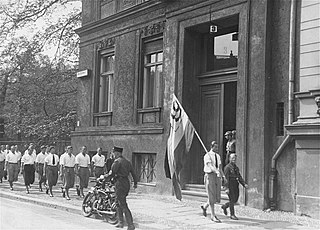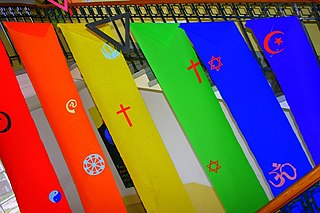Related Research Articles

Lesbian, gay, bisexual, transgender and queer (LGBTQ) movements are social movements that advocate for LGBTQ people in society. Although there is not a primary or an overarching central organization that represents all LGBTQ people and their interests, numerous LGBTQ rights organizations are active worldwide. The first organization to promote LGBTQ rights was the Scientific-Humanitarian Committee, founded in 1897 in Berlin.
Conversion therapy is the pseudoscientific practice of attempting to change an individual's sexual orientation, romantic orientation, gender identity, or gender expression to align with heterosexual and cisgender norms. Methods that have been used to this end include forms of brain surgery, surgical or chemical (hormonal) castration, aversion therapy treatments such as electric shocks, nausea-inducing drugs, hypnosis, counseling, spiritual interventions, visualization, psychoanalysis, and arousal reconditioning. There is a scientific consensus that conversion therapy is ineffective at changing a person's sexual orientation or gender identity and that it frequently causes significant long-term psychological harm. The position of current evidence-based medicine and clinical guidance is that homosexuality, bisexuality, and gender variance are natural and healthy aspects of human sexuality. An increasing number of jurisdictions around the world have passed laws against conversion therapy.

The University of Waterloo is a public research university with a main campus in Waterloo, Ontario, Canada. The main campus is on 404 hectares of land adjacent to uptown Waterloo and Waterloo Park. The university also operates three satellite campuses and four affiliated university colleges. The university offers academic programs administered by six faculties and thirteen faculty-based schools. Waterloo operates the largest post-secondary co-operative education program in the world, with over 20,000 undergraduate students enrolled in the university's co-op program. Waterloo is a member of the U15, a group of research-intensive universities in Canada.

The Institut für Sexualwissenschaft was an early private sexology research institute in Germany from 1919 to 1933. The name is variously translated as Institute for Sexual Research, Institute of Sexology, Institute for Sexology, or Institute for the Science of Sexuality. The Institute was a non-profit foundation situated in Tiergarten, Berlin. It was the first sexology research center in the world.
Gender expression, or gender presentation, is a person's behavior, mannerisms, and appearance that are socially associated with gender, namely femininity or masculinity. Gender expression can also be defined as the external manifestation of one's gender identity through behavior, clothing, hairstyles, voice, or body characteristics. Typically, a person's gender expression is thought of in terms of masculinity and femininity, but an individual's gender expression may incorporate both feminine and masculine traits, or neither. A person's gender expression may or may not match their assigned sex at birth. This includes gender roles, and accordingly relies on cultural stereotypes about gender. It is distinct from gender identity.

The gay liberation movement was a social and political movement of the late 1960s through the mid-1980s in the Western world, that urged lesbians and gay men to engage in radical direct action, and to counter societal shame with gay pride. In the feminist spirit of the personal being political, the most basic form of activism was an emphasis on coming out to family, friends, and colleagues, and living life as an openly lesbian or gay person.
The origin of the LGBTQ student movement can be linked to other activist movements from the mid-20th century in the United States. The Civil Rights Movement and Second-wave feminist movement were working towards equal rights for other minority groups in the United States. Though the student movement began a few years before the Stonewall riots, the riots helped to spur the student movement to take more action in the US. Despite this, the overall view of these gay liberation student organizations received minimal attention from contemporary LGBTQ historians. This oversight stems from the idea that the organizations were founded with haste as a result of the riots. Others historians argue that this group gives too much credit to groups that disagree with some of the basic principles of activist LGBTQ organizations.

Canadian lesbian, gay, bisexual, transgender, and queer (LGBTQ) rights are some of the most extensive in the world. Same-sex sexual activity, in private between consenting adults, was decriminalized in Canada on June 27, 1969, when the Criminal Law Amendment Act, 1968–69 was brought into force upon royal assent. In a landmark decision in 1995, Egan v Canada, the Supreme Court of Canada held that sexual orientation is constitutionally protected under the equality clause of the Canadian Charter of Rights and Freedoms. In 2005, Canada became the fourth country in the world, and the first in the Americas, that legalized same-sex marriage. In 2022, Canada was the third country in the world, and the first in North America, that statutorily banned conversion therapy nationwide for both minors and adults, and made it a crime to subject anyone to it, as defined by statutory law in the Criminal Code.

Homosexuality is sexual attraction, romantic attraction, or sexual behavior between members of the same sex or gender. As a sexual orientation, homosexuality is "an enduring pattern of emotional, romantic, and/or sexual attractions" exclusively to people of the same sex or gender. It "also refers to a person's sense of identity based on those attractions, related behaviors, and membership in a community of others who share those attractions."

Ottawa Capital Pride is an annual LGBTQ pride event, festival, and parade held in Ottawa, Ontario, Canada, and Gatineau, Quebec, from mid to late August. Established in 1986, it has evolved into a 7 to 9-day celebration of the 2SLGBTQIA+ community, advocating for equality, diversity, and inclusion in the National Capital Region. The festival offers bilingual events in English and French, known as 'Capital Pride / Fierté dans la capitale', seamlessly blending local pride with national importance.

New Zealand society is generally accepting of lesbian, gay, bisexual, transgender and queer (LGBTQ) peoples. The LGBTQ-friendly environment is epitomised by the fact that there are several members of Parliament who belong to the LGBTQ community, LGBTQ rights are protected by the Human Rights Act, and same-sex couples are able to marry as of 2013. Sex between men was decriminalised in 1986. New Zealand has an active LGBTQ community, with well-attended annual gay pride festivals in most cities.

LGBTQ movements in the United States comprise an interwoven history of lesbian, gay, bisexual, transgender and queer social movements in the United States of America, beginning in the early 20th century. A commonly stated goal among these movements is social equality for LGBTQ people. Some have also focused on building LGBTQ communities or worked towards liberation for the broader society from biphobia, homophobia, and transphobia. LGBTQ movements organized today are made up of a wide range of political activism and cultural activity, including lobbying, street marches, social groups, media, art, and research. Sociologist Mary Bernstein writes:
For the lesbian and gay movement, then, cultural goals include challenging dominant constructions of masculinity and femininity, homophobia, and the primacy of the gendered heterosexual nuclear family (heteronormativity). Political goals include changing laws and policies in order to gain new rights, benefits, and protections from harm.
The Lambda Foundation, officially the Lambda Scholarship Foundation Canada, is a registered Canadian charity with the mission of creating scholarships, awards, and bursaries in support of 2SLGBTQ+ studies, and education and awareness, in advancement of equality and human rights.
Communist attitudes towards LGBTQ rights have evolved radically in the 21st century. In the 19th and 20th century, communist parties and Marxist–Leninist states varied on LGBTQ rights; some Western and Eastern parties were among the first political parties to support LGBTQ rights, while others, especially the Soviet Union, some of its Eastern Bloc members, and the Communist East Asian nations harshly persecuted people of the LGBTQ community.

The relationship between religion and lesbian, gay, bisexual, transgender and queer (LGBTQ) people can vary greatly across time and place, within and between different religions and sects, and regarding different forms of homosexuality, bisexuality, non-binary, and transgender identities. More generally, the relationship between religion and sexuality ranges widely among and within them, from giving sex and sexuality a rather negative connotation to believing that sex is the highest expression of the divine.
This article gives a broad overview of lesbian, gay, bisexual and transgender (LGBT) history in Canada. LGBT activity was considered a crime from the colonial period in Canada until 1969, when Bill C-150 was passed into law. However, there is still discrimination despite anti-discrimination law. For a more detailed listing of individual incidents in Canadian LGBT history, see also Timeline of LGBT history in Canada.

Discrimination against gay men, sometimes called gayphobia, is a form of homophobic prejudice, hatred, or bias specifically directed toward gay men, male homosexuality, or men who are perceived to be gay. This discrimination is closely related to femmephobia, which is the dislike of, or hostility toward, individuals who present as feminine, including gay and effeminate men.
Disability and LGBTQ+ identity can both play significant roles in the life of an individual. Disability and sexuality can often intersect, for many people being both disabled and LGBTQ+ can result in double marginalization. The two identities, either by themselves or in tandem, can complicate questions of discrimination and can effect access to resources such as accommodations, support groups, and elder care.
Pride UBC, originally called Gay People of UBC, is an organization created by and for gay people at the University of British Columbia. It intended to help student members socialize and discuss issues important to the community.
References
- 1 2 3 "Glow Centre for Sexual and Gender Diversity". Waterloo Undergraduate Student Association. Retrieved 18 October 2023.
- ↑ Bean, Heather (17 March 2016). "A Waterloo pioneer for LGBTQ rights". Waterloo News. Retrieved 18 October 2023.
- ↑ Needham, Jessica (8 March 2016). "We're here, we're queer, and it's been 45 years". Imprint. Retrieved 18 October 2023.
- ↑ "Events in Grand River Rainbow Communities: 1970". www.grandriver-rainbowhistory.ca. Retrieved 18 October 2023.
- ↑ Kidd, Paul (19 January 1972). ""Sex fest" wasn't quite as sexy as it sounded". North Bay Nugget. p. 30.
- 1 2 Ellie (15 June 2021). "2SLGBTQIA+ History in Waterloo Region". Kitchener Public Library. Retrieved 18 October 2023.
- ↑ Rose, Nicola (10 March 2021). "UW Celebrates Glow's 50th Anniversary, International Women's Day". Imprint. Retrieved 18 October 2023.
- ↑ Schuck, Paula (11 March 1996). "Robinson praises work of gay group". The Record. p. 9.
- ↑ Operation Socrates handbook. Waterloo: Federation of Students. 1973. Retrieved 18 October 2023.
- ↑ "LGLC - Summer Waterloo, Ont. Operation […]". lglc.ca. Retrieved 18 October 2023.
- 1 2 "Ottawa provides $9,290 for homosexuality study". The Kingston Whig-Standard. 5 May 1973. p. 32.
- ↑ "Students' gay lib handbook sent to Kitchener schools". The Toronto Star. 17 November 1973. p. 5.
- 1 2 3 "Senator asks probe of homosexual book". Kitchener-Waterloo Record. 22 November 1973. p. 11.
- ↑ Etherington, Frank (16 November 1973). "Collegiates get book on homosexuals". Kitchener-Waterloo Record. p. 3.
- ↑ Murray, Margaret (29 November 1973). "Letters: That handbook clarified". Kitchener-Waterloo Record. p. 6.
- ↑ Jackson, Richard (2 August 1973). "Now: a federal grant for a book on homosexuality". The North Bay Nugget. p. 9.
- 1 2 Jackson, Richard (16 November 1973). "Grant to OFY sets off fuss". The North Bay Nugget. p. 4.
- 1 2 Pender, Terry (25 November 2017). "RCMP spied on gay community in Waterloo Region". The Record. Retrieved 18 October 2023.